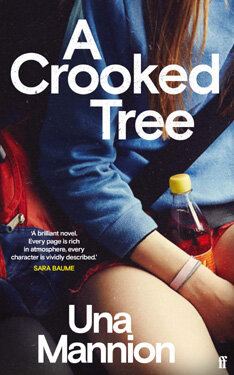I enjoy it when I'm wrong-footed as to what a novel is really about until I get into the heart of its story. “Asylum Road” is very cleverly structured in how it carefully reveals information in different sections as it carries you through the emotional journey of its protagonist Anya, a 20-something PhD student. The novel's opening line is “Sometimes it felt like the murders kept us together.” But rather than describing a couple who commit murders it goes on to detail their journey from London to France while listening to true crime dramas along the way. Anya is tense thinking her ecologically-minded boyfriend Luke might break up with her on this trip but it turns out he proposes to her with a diamond ring. It feels like this will become a typical modern-day story of the highs and lows of romance yet the ominous tone of that opening line remains and is carried through the story as we gradually learn that Anya was a survivor of the Seige of Sarajevo which occurred when she was a girl. But this isn't a historical account of the Bosnian War. Instead it shows the day to day experience of someone living with a deep trauma that other people are incapable of understanding.
The tone of unreconciled violence in this story is perfectly encapsulated in an early scene where Anya refers to her Balkan heritage when making casual dinner conversation with an elderly woman at someone else's wedding. It's described how “She'd blinked at me kindly and said it must be sad when your country no longer exists, then returned to pulverising her asparagus.” Similarly, there seems no way to create a bridge in understanding between Anya and Luke regarding Anya's past. In the second section of the book they travel back to her homeland to reconnect with her family including her mother who is suffering from Alzheimer's. The awkwardness of this journey and the emotional tug of war which occurs in a day to day relationship is vividly described: “His moods would shift abruptly, and at times I would find myself having crossed an obscure boundary into a strange place, a territory which only minutes ago had not been there.” Not only does Anya still carry with her the constant threat she experienced in childhood, but there's also the ever-present danger of being exiled from this relationship which seems like it will be cemented in marriage but remains precariously fragile.
It's admirable how Sudjic draws us so close to the reality of Anya's experience yet there's a building tension as the reader grapples to understand her motives. Often she seems trapped in a kind of inertia when she doesn't respond to someone speaking to her or make progress with larger elements of her life like working on her PhD. Instead the past constantly threatens to drown her like an undertow and we feel an ominous panic suddenly surge up to make her experience a debilitating vertigo. I greatly sympathised with Anya who wants to achieve a comforting stasis yet finds the world is in a constant state of flux – both in her personal life and the larger society. There are references to Brexit and recent terrorist attacks in London which have resulted in the creation of both mental and physical barriers between people. Despite being informed and connected through the news, the novel signals how there will always be a tragic gap between living through a traumatic experience and viewing it from the outside. The way in which “Asylum Road” artfully conveys this makes it a powerful and haunting story.
























